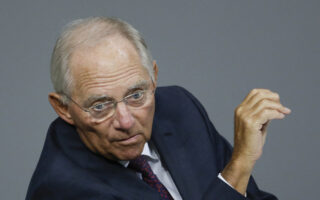The troubled relationship between Greece and Schaeuble

“I can now observe my life as it comes to an end. I find it exciting to observe myself,” Wolfgang Schaeuble, Germany’s former finance minister, said in one of the last interviews he gave before his death on Tuesday. “Yes, I feel lonely,” he told Der Spiegel magazine a month ago.
Schaeuble knew that he was dying of cancer, but he did not want it known outside his close family circle. He didn’t want the crocodile tears and laudatory speeches, the ersatz commiserations. He was as blunt when it came to his own life as he was with his country, as he was with Greece.
In reality, the chancellor’s views on the Greek question differed from her finance minister’s only in how she expressed them publicly
His relationship with Greece was defined by a communication breakdown on both sides. Schaeuble could not understand how Athens could want to remain in the eurozone while resisting fiscal consolidation and reforms (euphemisms for the harsh austerity that led to the population’s dramatic pauperization and skyrocketing unemployment). Greek public opinion, for its part, insisted on interpreting his policies in psychiatric, geographical, religious or historical terms, as a reaction to the fact that he was confined to a wheelchair, that as a Protestant he could not abide our Mediterranean joie de vivre etc. He was maligned more than any other foreign politician in this country, spoken of with despicable derogatory terms – even in official public dialogue on occasion – and often teased for his disability by Greek cartoonists or depicted like a Nazi jailer. It was because of Schaeuble rather than Angela Merkel that traditional Greek anti-American sentiment was replaced by anti-German sentiment during the crisis. In reality, the chancellor’s views on the Greek question differed from her finance minister’s only in how she expressed them publicly.
Behind the caricature we made of him, though, Schaeuble was an unrepentant federalist: one of the architects of unified Germany and a passionate champion of a unified Europe. His harsh stance during the Greek debt crisis was dictated by sensibility of the fact that his fellow Germans had seen their salaries and pensions stagnate for a decade when his country was the “sick man of Europe,” and by fears for the eurozone’s future.
The fact that death so constantly loomed over him could have turned him into a cynic. In contrast to what most Greeks believed, that didn’t happen.





